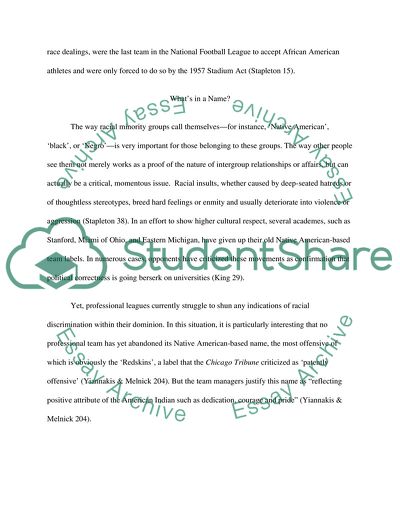Cite this document
(“Adopting Native American Names - Abandoning Redskins Research Paper”, n.d.)
Adopting Native American Names - Abandoning Redskins Research Paper. Retrieved from https://studentshare.org/culture/1630488-should-the-washington-dc-professional-football-team-change-its-namemascot-in-response-to-recent-criticism-why-or-why-not-your-response-must-be-fully-supported-with-clear-evidence-from-your-critical-sources
Adopting Native American Names - Abandoning Redskins Research Paper. Retrieved from https://studentshare.org/culture/1630488-should-the-washington-dc-professional-football-team-change-its-namemascot-in-response-to-recent-criticism-why-or-why-not-your-response-must-be-fully-supported-with-clear-evidence-from-your-critical-sources
(Adopting Native American Names - Abandoning Redskins Research Paper)
Adopting Native American Names - Abandoning Redskins Research Paper. https://studentshare.org/culture/1630488-should-the-washington-dc-professional-football-team-change-its-namemascot-in-response-to-recent-criticism-why-or-why-not-your-response-must-be-fully-supported-with-clear-evidence-from-your-critical-sources.
Adopting Native American Names - Abandoning Redskins Research Paper. https://studentshare.org/culture/1630488-should-the-washington-dc-professional-football-team-change-its-namemascot-in-response-to-recent-criticism-why-or-why-not-your-response-must-be-fully-supported-with-clear-evidence-from-your-critical-sources.
“Adopting Native American Names - Abandoning Redskins Research Paper”, n.d. https://studentshare.org/culture/1630488-should-the-washington-dc-professional-football-team-change-its-namemascot-in-response-to-recent-criticism-why-or-why-not-your-response-must-be-fully-supported-with-clear-evidence-from-your-critical-sources.


